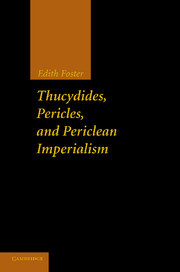Description
Thucydides, Pericles, and Periclean Imperialism
Author: Foster Edith
Edith Foster compares Thucydides' narrative explanations and descriptions of the Peloponnesian War in Books One and Two of the History.
Language: English
Subject for Thucydides, Pericles, and Periclean Imperialism:
Approximative price 49.66 €
In Print (Delivery period: 14 days).
Add to cart
Thucydides, Pericles, and Periclean Imperialism
Publication date: 10-2013
Support: Print on demand
Publication date: 10-2013
Support: Print on demand
Approximative price 93.25 €
In Print (Delivery period: 14 days).
Add to cart
Thucydides, pericles, and periclean imperialism
Publication date: 05-2010
256 p. · 15.9x23.5 cm · Hardback
Publication date: 05-2010
256 p. · 15.9x23.5 cm · Hardback
Description
/li>Contents
/li>Biography
/li>
Edith Foster compares Thucydides' narrative explanations and descriptions of the Peloponnesian War in Books One and Two of the History with the arguments about warfare and war materials offered by the Athenian statesman Pericles in those same books. In Thucydides' narrative presentations, she argues, the aggressive deployment of armed force is frequently unproductive or counterproductive, and even the threat to use armed force against others causes consequences that can be impossible for the aggressor to predict or contain. By contrast, Pericles' speeches demonstrate that he shared with many other figures in the History a mistaken confidence in the power, glory, and reliability of warfare and the instruments of force. Foster argues that Pericles does not speak for Thucydides, and that Thucydides should not be associated with Pericles' intransigent imperialism.
Introduction; 1. War materials and their glory in archaeology; 2. Arms and passion: Corinth and Corcyra at war; 3. The Athenian acme in book one of Thucydides: the Spartan War; 4. Pericles in history; 5. Pericles and Athens: Pericles' speech in indirect discourse in narrative context; 6. Thucydides and Pericles' final speeches; Conclusion.
Edith Foster is Assistant Professor of History at Ashland University in Ohio. She has contributed articles to the American Journal of Philology, Humanitas, and Academe and has published book reviews in Classical Philology, Bryn Mawr Classical Reviews, and Gnomen.
© 2024 LAVOISIER S.A.S.




